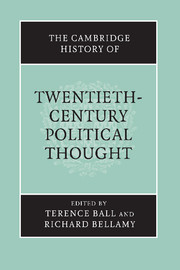Book contents
- Frontmatter
- Editors’ introduction
- Part I The changing fortunes of liberal democracy
- Part II Varieties of Marxism
- Part III Science, modernism and politics
- 15 Positivism: reactions and developments
- 16 Postmodernism: pathologies of modernity from Nietzsche to the post-structuralists
- 17 Weber, Durkheim and the sociology of the modern state
- 18 Freud and his followers
- 19 Modernism in art, literature and political theory
- 20 The new science of politics
- 21 Utilitarianism and beyond: contemporary analytical political theory
- Part IV New social movements and the politics of difference
- Part V Beyond Western political thought
- Biographies
- Bibliography
- Subject index
- Name index
- References
16 - Postmodernism: pathologies of modernity from Nietzsche to the post-structuralists
from Part III - Science, modernism and politics
Published online by Cambridge University Press: 28 March 2008
- Frontmatter
- Editors’ introduction
- Part I The changing fortunes of liberal democracy
- Part II Varieties of Marxism
- Part III Science, modernism and politics
- 15 Positivism: reactions and developments
- 16 Postmodernism: pathologies of modernity from Nietzsche to the post-structuralists
- 17 Weber, Durkheim and the sociology of the modern state
- 18 Freud and his followers
- 19 Modernism in art, literature and political theory
- 20 The new science of politics
- 21 Utilitarianism and beyond: contemporary analytical political theory
- Part IV New social movements and the politics of difference
- Part V Beyond Western political thought
- Biographies
- Bibliography
- Subject index
- Name index
- References
Summary
Defining postmodernism
In the last quarter of the twentieth century the concept of postmodernism, and the associated notion of postmodernity, became a principal focus of discussion in philosophy, cultural analysis, and social and political theory. The notion of ‘postmodernism’ had originally emerged in an aesthetic context, at least as long ago as the 1930s, but the term was only used sporadically until the boom in its scope and currency from the mid-1970s onwards. This popularisation began in the domain of architecture, where the adjective ‘postmodern’ was employed to characterise the rebellion against the technocratic functionalism of the ‘international style’ which was then under way (Jencks 1991 [1978]). But from here its use spread rapidly, first to describe new developments in literature, painting and other artistic media, and then to characterise a whole range of social and cultural developments which were assumed to represent a break with the defining practices and styles of thought of the modern era. Indeed, for some of its more enthusiastic proponents, the emergence of postmodernism signalled nothing less than the transition to a new historical epoch, beyond modernity.
This epochal significance of the postmodern was given an influential pioneering formulation by the French philosopher Jean-François Lyotard in his book, La condition postmoderne (The Postmodern Condition), first published in 1979. Part of the success of this work, which presented a series of provocative and fertile ideas rather than a carefully constructed argument, was due to the compactness with which Lyotard defined his key term. For Lyotard, the postmodern condition was characterised by the delegitimation of ‘grand narratives’, or ‘incredulity toward meta-narratives’ (Lyotard 1984, pp. 37–41, xxiv). On his account, the grand schemata of historical progress and social development stemming from the Enlightenment, whether liberal or Marxist in inspiration, had finally lost all credibility.
- Type
- Chapter
- Information
- The Cambridge History of Twentieth-Century Political Thought , pp. 343 - 367Publisher: Cambridge University PressPrint publication year: 2003
References
- 1
- Cited by

